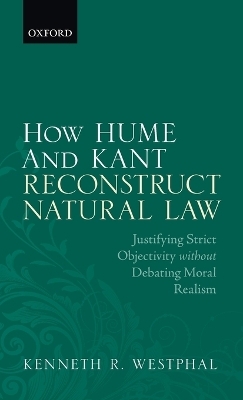
How Hume and Kant Reconstruct Natural Law
Oxford University Press (Verlag)
978-0-19-874705-5 (ISBN)
Kenneth R. Westphal presents an original interpretation of Hume's and Kant's moral philosophies, the differences between which are prominent in current philosophical accounts. Westphal argues that focussing on these differences, however, occludes a decisive, shared achievement: a distinctive constructivist method to identify basic moral principles and to justify their strict objectivity, without invoking moral realism nor moral anti-realism or irrealism. Their constructivism is based on Hume's key insight that 'though the laws of justice are artificial, they are not arbitrary'. Arbitrariness in basic moral principles is avoided by starting with fundamental problems of social coördination which concern outward behaviour and physiological needs; basic principles of justice are artificial because solving those problems does not require appeal to moral realism (nor to moral anti-realism). Instead, moral cognitivism is preserved by identifying sufficient justifying reasons, which can be addressed to all parties, for the minimum sufficient legitimate principles and institutions required to provide and protect basic forms of social coördination (including verbal behaviour). Hume first develops this kind of constructivism for basic property rights and for government. Kant greatly refines Hume's construction of justice within his 'metaphysical principles of justice', whilst preserving the core model of Hume's innovative constructivism. Hume's and Kant's constructivism avoids the conventionalist and relativist tendencies latent if not explicit in contemporary forms of moral constructivism.
Kenneth R. Westphal is Professor of Philosophy at Bogaziçi Üniversitesi, Istanbul. His research concerns the character and scope of rational justification in non-formal, substantive domains, including both theoretical philosophy (epistemology, history, and philosophy of science) and moral philosophy (ethics, social, political. and legal philosophy). This, his fifth monograph, is his first published by the Clarendon Press; others are issued by Cambridge University Press, Vittorio Klostermann, and Hackett Publishing Co. He has edited four collections of research and published nearly 150 research articles, in such journals as Synthese, Dialogue, Journal of the History of Philosophy, Philosophical Inquiries, Journal for the History of Analytic Philosophy, HOPOS, and Jurisprudence. His article, 'Kant on the State, Law, and Obedience to Authority in the Alleged 'Anti-Revolutionary' Writings' (1992, rpt. 2006) received the 1994 George Armstrong Kelly Prize.
Acknowledgements ; Primary Sources and Citation Methods ; 1. Reconstructing Moral Constructivism ; 2. Objectivity, the Euthyphro Question, and Reconstructing Natural Law ; 3. Hume's Construction of Justice ; 4. Hume's Proof of the Insufficiency of Moral Sentiments ; 5. Kant's Moral Constructivism ; 6. Natural Law Constructivism and Rational Justification ; 7. Constructivism, Contractarianism, and Basic Obligations ; 8. Kant's Justification of Rights to Possession ; 9. Conclusion: Reintegrating Justice into Morals ; Appendix ; Bibliography ; Name Index ; Subject Index
| Erscheinungsdatum | 09.04.2016 |
|---|---|
| Verlagsort | Oxford |
| Sprache | englisch |
| Maße | 144 x 222 mm |
| Gewicht | 432 g |
| Themenwelt | Geisteswissenschaften ► Philosophie ► Ethik |
| Geisteswissenschaften ► Philosophie ► Geschichte der Philosophie | |
| Geisteswissenschaften ► Philosophie ► Philosophie der Neuzeit | |
| ISBN-10 | 0-19-874705-5 / 0198747055 |
| ISBN-13 | 978-0-19-874705-5 / 9780198747055 |
| Zustand | Neuware |
| Informationen gemäß Produktsicherheitsverordnung (GPSR) | |
| Haben Sie eine Frage zum Produkt? |
aus dem Bereich


